-
Israel, U.K. worried about “anniversary” Olympic attack by Iranian agents

Forty years ago, during the Munich Summer Olympic Games, terrorists belonging to the Palestinian Black September organization entered the Olympic Village, kidnapped members of the Israeli Olympic team, then killed eleven of them and injured twenty more during a botched German rescue operation; there is worry in Israel and London that Iran, using its own operatives or Hezbollah’s, would try a spectacular 40-year anniversary attack on the Israeli delegation to the games
-
-
U.S. to send hand-launched UAVs to Kenya to help fight Somali al Shabaab
The United States will include hand-launched Raven UAV’s in the $41.4 million military aid package to Kenya; the package also includes trucks, communications gear, and rifles for Burundi, Djibouti, and Uganda; the military aid aims to help east African countries cope with the growing menace of al Shabaab, a Somali al Qaeda affiliate
-
-
Federal apprehensions for immigration violations declined, while arrests tripled, in 2000-10
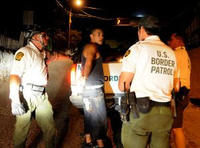
Apprehensions for immigration violations peaked at 1.8 million in 2000 but dropped to 516,992 in 2010 — the lowest level since 1972, according to a report released last week by the Justice Department’s Bureau of Justice Statistics (BJS); between 2000 and 2010, arrests booked by the U.S. Marshals Service for federal immigration offenses tripled, from 25,205 to 82,438 arrests; immigration apprehensions resulted in about 16 arrests per 100 apprehensions in 2010, up from 2 arrests per 100 in 2002
-
-
ICE agents say Obama’s 15 June executive order makes their job more difficult
Association of ICE agents complains that the 15 June executive order which deferred deportation action against certain classes of illegal immigrants makes it difficult for ICE to enforce immigration laws
-
-
Firms with political ties may be bad investment
It may pay to invest, but, counter intuitively perhaps, it might be worth more to invest in companies that do not have political ties; politically connected firms typically have greater cash holdings than non-connected firms; the reason: managers of such companies need to have more cash on hand to be used as a resource for the firms’ political friends; this hoarding of excess cash runs contrary to the notion of maximizing profit and value for a company’s shareholders
-
-
Bulgaria attack shows Iran’s terror strategy
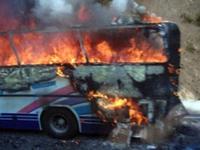
The Wednesday suicide-bombing attack by a Hezbollah operative on a bus carrying Israeli tourists on their way to a Bulgaria sea resort, an attack in which six Israeli were killed and thirty-five injured, is an indication that Iran has decided to increase the cost to Israel, and the United States and the West more generally, of a set of policies which have materially undermined Iran’s interests; Iran has built a large network of terror sleeping cells in Europe and the Americas, operated by the Iranian Quds Force, an elite international operations unit within Iran’s Islamic Revolutionary Guards Corps, and by Hezbollah, a network it intends to activate where and when it serves its interests
-
-
Hezbollah suicide bomber kills Israeli tourists in Bulgaria
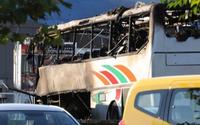
A Hezbollah-trained suicide bomber, carrying a forged Michigan-issued driver’s license, blew himself up in a bus carrying Israeli tourists, killing seven and injuring thirty-four; the attack appears to be part of a campaign launched by Iran several months ago in retaliation for the killing of Iranian nuclear scientists by the Israeli Mossad; Iranian intelligence operatives have recently attempted attacks on Israeli targets in India, Thailand, Azerbaijan, Kenya, and Cyprus
-
-
Bulgaria bus bombing underscores vulnerability of public transport: MTI experts
The Mineta Transportation Institute’s (MTI) Database on Terrorist and Serious Criminal Attacks Against Public Surface Transportation records 3,159 attacks against public surface transportation between January 1970 and January 2012, in which 7,997 people were killed and 30,046 were injured; of these attacks, 47.4 percent were against buses, bus stations, and bus stops; they accounted for 55 percent of the fatalities and 41 percent of the injuries resulting from terrorist attacks during this period
-
-
The Top 3 Syrian security officials assassinated by rebels
In the heaviest blow yet to the Assad regime, a bomb placed inside the fortress-like National Security headquarters in Damascus earlier today killed the three top commanders of the regime’s anti-insurgency effort: Defense Minster Dawoud Rajha; Deputy Defense Minister (and Assad’s brother-in-law) Assef Shawkat; and Hassan Turkmani, a former defense minister who was serving as head of the regime’s central command unit for crisis management a secure room; the bomb was placed in the secure room, where a meeting of the central command unit for crisis management was taking place, by a bodyguard assigned to Assad’s inner circle; the assassination, and the way it was carried out, demonstrate daring, operational competence, and excellent intelligence; the operation reflects, more generally, a noticeable increase in the lethality and effectiveness of the rebel forces, and the growing vulnerability of the regime
-
-
House designates Haqqani Network as a terrorist organization
The U.S. House of Representative yesterday voted to designate the Haqqani Network as Foreign Terrorist Organization (FTO); the network has been supported and armed by Pakistan, which uses the Haqqanis to attack U.S. and coalition soldiers, aid the Taliban, destabilize the Karzai government, and frustrate U.S. Afghan strategy; if the Senate approves the House bill, this would mean designating the Pakistani government, or at least some of its major agencies, as supporters of terrorism, making it legally difficult for the United States to continue and send billions of dollars in military and civilian aid to Pakistan
-
-
Scaled-back Kansas biolab would meet U.S. needs

A report by the National Research Council says that it is “imperative” that the United States build a large-animal biocontainment laboratory to protect animal and public health; two options are acceptable: a $1.4 billion Biosafety Level 4 laboratory in Manhattan, Kansas, or a scaled-back Kansas lab tied to a distributed laboratory network in other facilities; a third option will not meet U.S. needs: maintaining current capabilities at Plum Island Animal Disease Center, because the Plum Island facilities do not meet current standards for high biocontainment
-
-
Short-sighted Tuareg leadership dooms independence quest
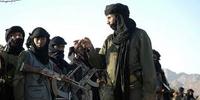
With the quickening pace of preparations for a military intervention to remove an al Qaeda-affiliated Islamist group from a break-away region of Mali, and disrupt this group’s plan to turn the region into what African leaders call “Africanistan,” the leaders of the MNLA, the Tuareg movement which fought for the independence of the region, said the MNLA would not participate in the operation against the Islamists unless it receives guarantees from outside powers that the goal of the operation will not be to re-unify Mali; the cause of Tuareg independence never had much support among the Tuareg people, and was resolutely opposed by neighboring states; the MNLA refusal to help in removing the Islamists from Azawad all but guarantees that the dream of Tuareg independence will remain just that – a dream
-
-
More generals defecting, worries about Syria’s chemical munitions
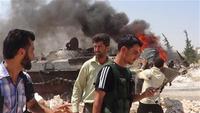
A few more Syrian generals defected to Turkey this weekend; the latest defections indicate a growing problem for the regime, as those defecting come from parts of the military where loyalty to the Assad family was key to promotion; among the defectors were two Alawite generals who were operations commanders of the Alawite Shabiha militia, one of the military units closest to Assad, a third general, a Sunni, headed the Syrian chemical warfare authority until 2008; last Thursday, Syria began to move chemical munitions from storage facilities to areas closer to the fighting; the United States informed Syria that Washington would view with extreme concern the removal from storage of any more chemical weapons
-
-
Competition among political forces, not religious fundamentalism, inflames anti-Americanism in the Muslim world

Historically, domestic political divisions within Muslim politics have fallen between secular elite and fundamental Islamic elite factions, with both groups laying claims to anti-American grievances; that competition is most intense not in the most deeply observant Islamic countries, but rather in countries where divisions between secular and religious factions are sharpest; in those countries, competition between political forces — not religious fundamentalism — appears to spark the greatest anti-American sentiment
-
-
Studies of nuclear weapons make a contribution to climate science
Nuclear weapons testing may at first glance appear to have little connection with climate change research, but key cold war research laboratories and the science used to track radioactivity and model nuclear bomb blasts have today been repurposed by climate scientists
-
More headlines
The long view
Preventing Another 'Jan. 6' Starts by Changing How Elections Are Certified, Experts Say
The 2024 presidential election may be a rematch between President Joe Biden and former President Donald Trump, but preventing a repeat of Jan. 6, 2021 — when false claims of a stolen election promoted by Donald Trump and his allies led to an insurrection at the U.S. Capitol —will be top of mind this election year. Research finds broad support among public for nonpartisan certification commissions.
States Rush to Combat AI Threat to Elections
This year’s presidential election will be the first since generative AI became widely available. That’s raising fears that millions of voters could be deceived by a barrage of political deepfakes. Congress has done little to address the issue, but states are moving aggressively to respond — though questions remain about how effective any new measures to combat AI-created disinformation will be.
Chinese Government Hackers Targeted Critics of China, U.S. Businesses and Politicians
An indictment was unsealed Monday charging seven nationals of the People’s Republic of China (PRC) with conspiracy to commit computer intrusions and conspiracy to commit wire fraud for their involvement in a PRC-based hacking group that spent approximately 14 years targeting U.S. and foreign critics, businesses, and political officials in furtherance of the PRC’s economic espionage and foreign intelligence objectives.
European Arms Imports Nearly Double, U.S. and French Exports Rise, and Russian Exports Fall Sharply
States in Europe almost doubled their imports of major arms (+94 per cent) between 2014–18 and 2019–23. The United States increased its arms exports by 17 per cent between 2014–18 and 2019–23, while Russia’s arms exports halved. Russia was for the first time the third largest arms exporter, falling just behind France.
LNG Exports Have Had No Impact on Domestic Energy Costs: Analysis
U.S. liquified natural gas (LNG) exports have not had any sustained and significant direct impact on U.S. natural gas prices and have, in fact, spurred production and productivity gains, which contribute to downward pressure on domestic prices.
Don’t Buy Moscow’s Shameless Campaign Tying Biden to Its Terrorist Attack
Russia has offered many different explanations to the ISIS-K’s 22 March 2024 terrorist attack at the Crocus City Hall in Moscow, but the most recent explanation offered by Russia is the most audacious yet: Russia now charges that the Ukrainian energy company Burisma financed the attack. Burisma is at the center of an effort by a congressional committee to impeach President Biden, but the case has all but collapsed. Hunter Stoll writes that Russia’s disinformation and propaganda apparatus appears to be searching for ways to keep Burisma in the news ahead of the U.S. presidential election.
